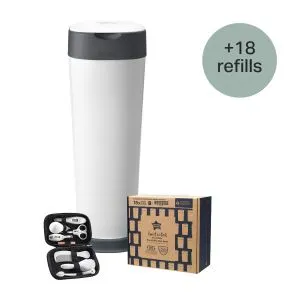
Ultimate XL Nappy Disposal Bundle with 18 Refills
Bundle & Save 40%
Subscription orders can be cancelled at anytime. Free delivery on all subsequent subscription orders. Find out more about subscriptions.
They’re easy and fuss free
Your products are automatically sent to you
You save up to 10% when you sign up for a subscription
You can cancel at any time
Newborn Poop Guide

When you break it down, newborn babies tend to do three things – eat, sleep and poop. And if you’ve recently become a parent, it may come as a shock to you just how many nappies your little one can get through a day.
Newborn poop isn’t very much like its adult counterpart, which can take you by surprise when you first start changing nappies. Here’s everything you need to know about what’s normal and what’s not in the world of newborn baby poop.
While there isn’t an exact poop quota your baby should meet each day, on average, babies have about four poops a day during the first week of their life. This decreases to an average of two per day by their first birthday.
Breast milk is considered a natural laxative, so breastfed babies may poop at every feed during their first few weeks. Thankfully, this 'in and out' phase doesn't last very long, and they might not poop for several days after the six-week mark. Formula-fed newborn babies, on the other hand, can poop up to five times a day. This reduces to as little as once a day after a few months.
While all of this might seem like too much poop to handle, there’s generally not a lot to worry about. Some babies are quite literally pooping machines, while others can go a few days without pooping at all!
If your baby seems happy and is eating well, chances are things are fine (even if you need to change them 12 times a day), but it’s always best to trust your parenting instinct and speak to your GP, midwife, or health visitor if you're worried about your little one's bowel movements.
There are different stages of baby poop, from meconium to normal newborn poop, and the colour and consistency may vary from day to day as their digestive system starts functioning. Let's run through each stage in more detail.
Meconium is a baby's first poop and it's already in the bowel at the time of birth.
It’s dark, thick, and tarry, and can be sticky and very hard to clean up. It contains cells and other substances that line your baby’s digestive tract during pregnancy. This kind of poop usually subsides after three or four days. You should speak to your GP if your baby hasn’t passed any meconium 48 hours after birth.
Greenish-coloured poop is usually a sign that the last of the meconium is leaving a baby's bowel. During this stage, their poop is still dark but has a green tinge as they start to digest milk.
From around day five, your baby's poop may look like it has seeds in it. Newborn poo at this stage is usually runny, but not very smelly. If your baby is formula-fed their poop may have a slightly darker tan shade and might be a bit smellier!
Explore the Range
As we’ve seen, newborn poops can vary hugely from baby to baby, week to week. If they’re eating well, gaining weight and growing, the chances are everything is fine.
It’s not unusual for a breastfed baby’s poop to be loose, but if they’re frequently passing watery stools, it could be a sign of diarrhoea.
Diarrhoea can be a symptom of many things, including:
It’s always best to get your baby checked out by a doctor if they have diarrhoea, to find out the root cause of their symptoms.
Remember, if your baby has diarrhoea, it’s important to keep an eye on their fluids. You may need to breastfeed more frequently (or offer them the bottle more often), to help them get the extra fluids they need to avoid dehydration.
Your baby might be constipated if they have any of the following symptoms:
There are a few reasons why your baby could be constipated, but the most common are:
Changes in diet: It’s not unusual for your baby to become constipated when they first start formula-feeding, or when you start introducing solid foods. There’s no need to worry, it’s just their body learning how to digest new things.
Dehydration: Constipation can be caused by a lack of fluids. There are many reasons for this, including:
It’s never easy to see your baby in pain or discomfort. The good news is there’s a few things you can do to help relieve their constipation:
Pooping problems can lead to irritation around your baby’s nappy area. Nappy rashes are super common (so no need to panic!) but they can be very uncomfortable.
If your baby already has a nappy rash causing them discomfort, you should use a nappy rash cream to treat it. It’s best to ask your health visitor or a pharmacist to recommend the best product for this.
There isn’t an ideal number of urinations for a newborn baby, but if their nappy is wet regularly, that’s a good sign.
On average, a newborn baby’s first week might look like this:
(24 hours after birth): Typically, 1 wee a day
(Day 1 to 2): Typically, 2 or more wees a day
(Day 3 to 4): Typically, 3 or more wees a day
(Day 5 to 6): Typically, 5 or more wees a day
The term ‘heavy nappy’ means a nappy full of wee or poop, that’s due for a change.
While newborn baby poo can be softer in consistency than its adult counterpart, watery poo may be a sign of diarrhoea.
If you think your baby has diarrhoea, it’s best to take them to see a doctor (young babies can become dehydrated very easily, especially if they’re under 6 months old).